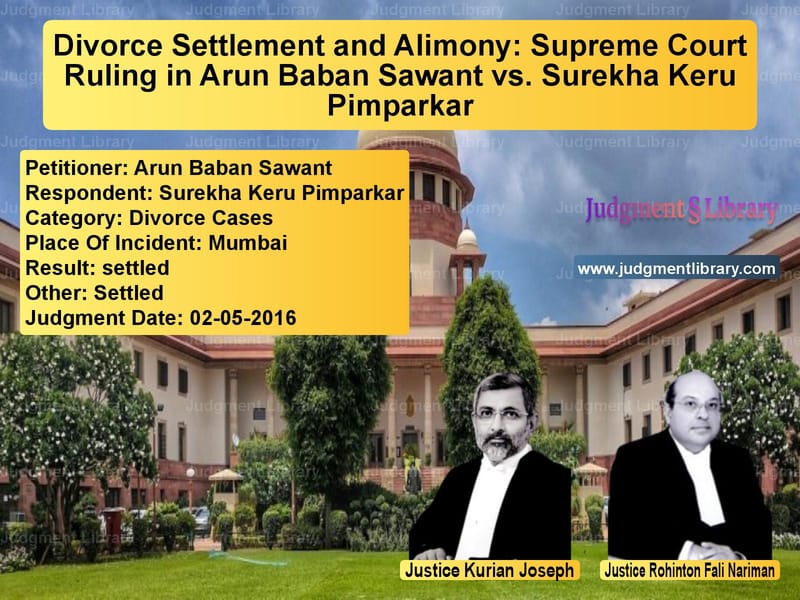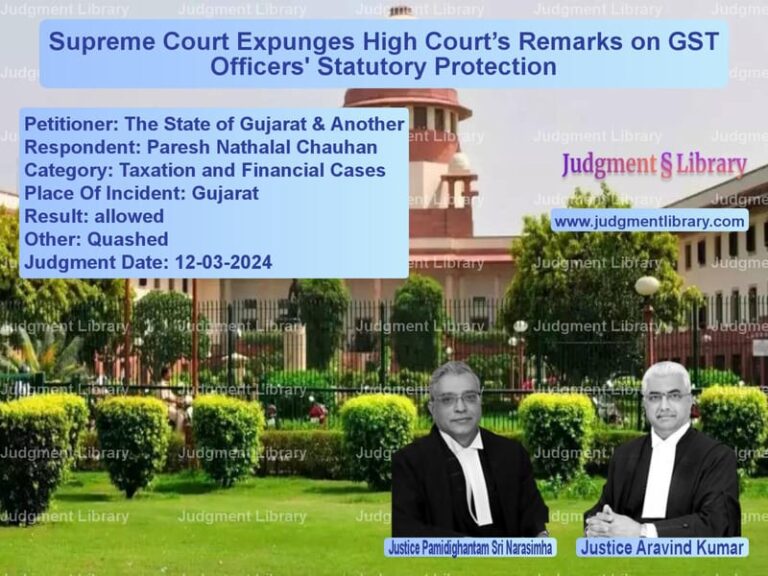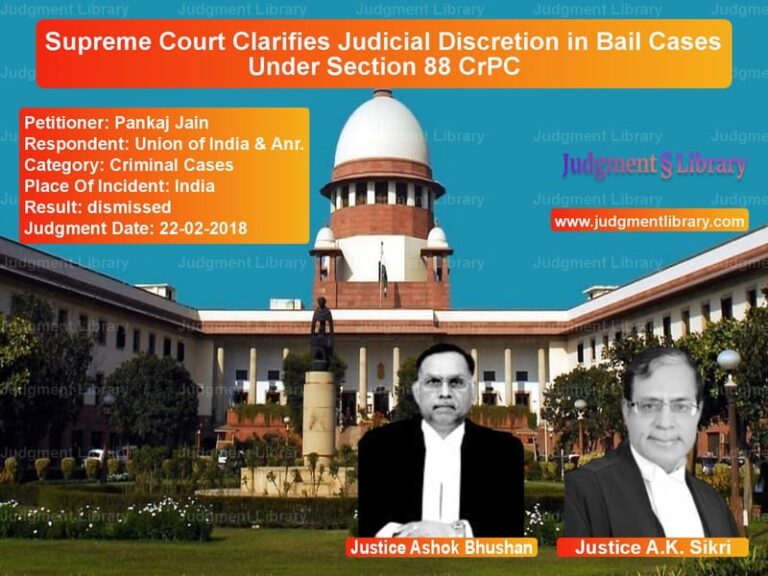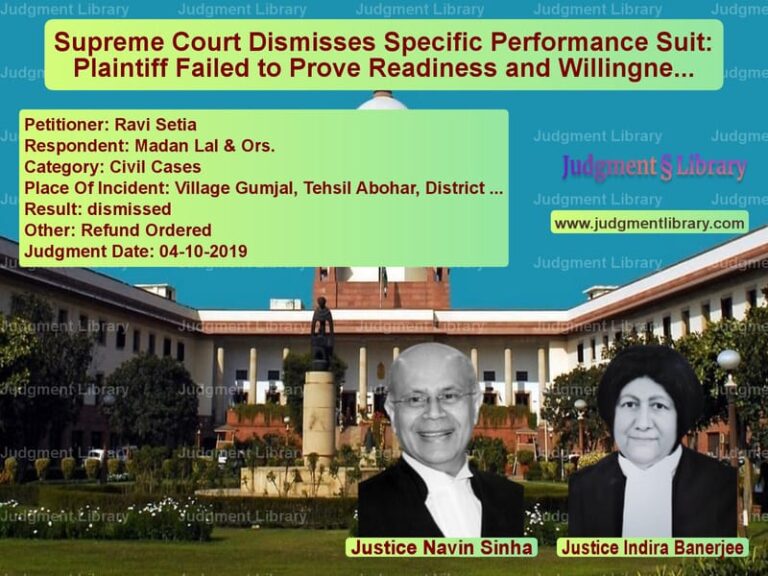Divorce Settlement and Alimony: Supreme Court Ruling in Arun Baban Sawant vs. Surekha Keru Pimparkar
The Supreme Court of India recently ruled in the case of Arun Baban Sawant vs. Surekha Keru Pimparkar, a significant case concerning divorce, alimony, child custody, and visitation rights. The judgment is a crucial reference for marital dispute resolutions and underscores the importance of amicable settlements.
Background of the Case
The case stemmed from marital discord between Arun Baban Sawant (appellant) and Surekha Keru Pimparkar (respondent), who had been legally divorced. The primary issues before the court were:
- Permanent alimony and maintenance for the respondent and their child.
- Visitation rights of the father regarding their daughter, Sanjana.
- Resolution of ongoing legal disputes between the parties in different courts.
The Supreme Court attempted mediation between the parties, and despite the earlier failure of court-led mediation, an amicable settlement was reached during the proceedings.
Settlement Terms
After negotiations in the presence of both parties and their legal representatives, the following terms were agreed upon:
Alimony and Child Maintenance
The appellant agreed to pay a total of Rs. 30 Lakhs to the respondent and their daughter within two and a half years from the date of judgment. The payment schedule was as follows:
- Rs. 10 Lakhs to be paid within six months via a demand draft in favor of the respondent, Surekha Keru Pimparkar.
- Rs. 10 Lakhs to be paid within the following year through a similar demand draft.
- Rs. 10 Lakhs to be paid in the final installment within a year after the second payment, directly in favor of their daughter, Sanjana.
The Court made it clear that failure to comply with this payment schedule would result in contempt proceedings against the appellant.
Visitation Rights
The appellant-father was granted visitation rights to meet his daughter, Sanjana, under specific conditions:
- Meetings would take place in the presence of a student counselor attached to her school.
- Visitation was allowed on two non-working Saturdays per month.
- Meeting time was fixed from 10:00 AM to 01:00 PM.
This arrangement ensured that the child’s welfare remained the priority while allowing the father to maintain a relationship with his daughter.
Cases Dismissed as Part of the Settlement
With the settlement, multiple cases pending in various courts between the parties were dismissed:
- Family Court Appeal No. 23 of 2011 in the Bombay High Court.
- Domestic Violence Case No. 174/N/2008 before the 49th Metropolitan Magistrate, Vikhroli, Mumbai.
- Contempt Petition No. 189 of 2012 in the Bombay High Court.
- Contempt Petition No. 692 of 2009 (renumbered as CMA No. 09 of 2010) in the Family Court, Thane.
- Execution Petition (RD No. 53 of 2010) before the Family Court, Thane.
- MP No. 188 of 2015 (New No. F-173/2010) before the Family Court, Thane.
The Supreme Court also recommended that the family members should not pursue Criminal Case No. 673 of 2009 pending before the Judicial Magistrate First Class (JMFC), Thane.
Legal and Judicial Observations
The Supreme Court bench, comprising Justice Kurian Joseph and Justice Rohinton Fali Nariman, emphasized the importance of mutual cooperation in resolving matrimonial disputes. The Court noted:
“Having regard to the various suggestions which have evolved in Court, having regard to the background of the parties, and having regard to the best interests of both the parties and their child, it is agreed that the settlement is just and reasonable.”
The Court further directed the Registry to communicate the judgment to all the courts where cases had been pending, ensuring a formal closure of disputes.
Implications of the Judgment
This judgment has several legal and social implications:
1. Encouragement of Amicable Settlements
The case sets a precedent for settling matrimonial disputes through mutual agreement rather than prolonged litigation. The Court actively facilitated a solution, which prevented further emotional and financial strain on both parties.
2. Financial Security for the Child
The structured financial settlement ensures that the child’s future is secured, as the final installment of Rs. 10 Lakhs is payable directly to the daughter.
3. Balanced Approach to Visitation Rights
The Court struck a balance between the father’s right to be involved in his child’s life and the child’s need for stability. The presence of a student counselor during visits ensures a healthy environment for the child.
4. Finality to Long-Standing Litigation
The dismissal of multiple legal cases between the parties prevents further legal entanglements, allowing both individuals to move forward with their lives.
Conclusion
The Supreme Court’s ruling in Arun Baban Sawant vs. Surekha Keru Pimparkar underscores the importance of amicable settlements in matrimonial disputes. By facilitating dialogue between the parties, the Court ensured that justice was not only served but also fostered a cooperative solution that benefits all involved, particularly the child.
This judgment highlights the Court’s commitment to dispute resolution methods that minimize conflict and promote fairness, setting a valuable precedent for future matrimonial cases.
Don’t miss out on the full details! Download the complete judgment in PDF format below and gain valuable insights instantly!
Download Judgment: Arun Baban Sawant vs Surekha Keru Pimpark Supreme Court of India Judgment Dated 02-05-2016-1741860879136.pdf
Direct Downlaod Judgment: Direct downlaod this Judgment
See all petitions in Alimony and Maintenance
See all petitions in Child Custody
See all petitions in Judgment by Kurian Joseph
See all petitions in Judgment by Rohinton Fali Nariman
See all petitions in settled
See all petitions in settled
See all petitions in supreme court of India judgments May 2016
See all petitions in 2016 judgments
See all posts in Divorce Cases Category
See all allowed petitions in Divorce Cases Category
See all Dismissed petitions in Divorce Cases Category
See all partially allowed petitions in Divorce Cases Category







